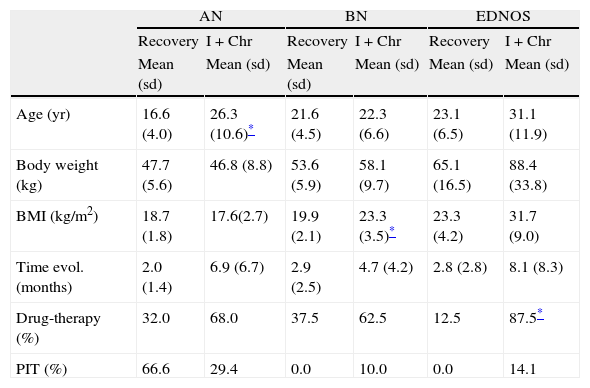There are several psychological approaches to treat ED with efficacy being revealed by empirical research; however none of them are universally accepted. The objective was to compare response to Cognitive Behavioral Therapy in patients with different clinical forms of Eating Disorders.
Material and methodSeventy-four patients diagnosed with eating disorders, 32 with Anorexia nervosa (AN), 19 with Bulimia nervosa (BN) and 23 with Eating disorders not otherwise specified (EDNOS) were included. This is a prospective and comparative study. Patients were treated by psychotherapy, nutritional treatment and pharmacotherapy.
ResultsThe recovery rates in the groups of patients with AN, BN and EDNOS were 14 (43.7%), 8 (42.1%), 10 (43.4%), respectively, p>0.05. The rates of improvement were 14 (43.7%), 10 (52.6%), 12 (52.1%) for AN, BN and EDNOS, respectively, p>0.05. Finally, the rate of patients who had poor outcome were 3 (9.3%), 1 (5.2%), and 1 (4.3%), p>0.05, for AN, BN, and EDNOS, respectively. Cox regression analysis showed that the age of disease onset and no use of psychotropic drugs predicted a good response in patients with ED.
ConclusionsThe treatment response to Cognitive Behavioral Therapy, nutritional support and psychotropic drugs in the majority of patients was favorable and similar in most patients with different types of Eating Disorders. Furthermore, a young age and no use of psychotropic drugs predict a favorable outcome in patients with ED.
Hay diferentes aproximaciones psicológicas para tratar los trastornos de la conducta alimentaria (TCA) que estudios empíricos han demostrado eficaces, sin embargo, ninguna de ellas está aceptada de manera universal. El objetivo fue comparar la respuesta a la terapia cognitivo-conductual en pacientes con diferentes formas clínicas de TCA.
Material y métodoSetenta y cuatro pacientes con diagnóstico de TCA, 32 con anorexia nerviosa (AN), 19 con bulimia nerviosa (BN) y 23 con trastornos alimentarios no especificados (TCANE), fueron incluidos. Se trata de un estudio prospectivo y comparativo. Los pacientes fueron tratados con psicoterapia, tratamiento nutricional y farmacológico.
ResultadosLa tasa de recuperación en los grupos de pacientes con AN, BN y TCANE fueron 14 (43,7%), 8 (42,1%) y 10 (43,4%), respectivamente (p>0,05). Las tasas de mejoría fueron 14 (43,7%), 10 (52,6%) y 12 (52,1%) para la AN, BN y TCANE, respectivamente (p>0,05). Finalmente, la tasa de pacientes que tuvieron mal resultado fueron 3 (9,3%), uno (5,2%) y uno (4,3%) (p>0,05) para AN, BN y TCANE, respectivamente. El análisis de regresión de Cox mostró que la edad de inicio de la enfermedad y el no uso de fármacos psicotrópicos prevén una buena respuesta en los pacientes con TCA.
ConclusionesLa respuesta al tratamiento con terapia cognitivo-conductual, soporte nutricional y uso de psicofármacos fue favorable y similar en la mayoría de nuestros pacientes con diferentes tipos de TCA. Por otra parte, una edad joven y el no uso de fármacos psicotrópicos predicen un resultado favorable en los pacientes con TCA.
Artículo
Comprando el artículo el PDF del mismo podrá ser descargado
Precio 19,34 €
Comprar ahora










